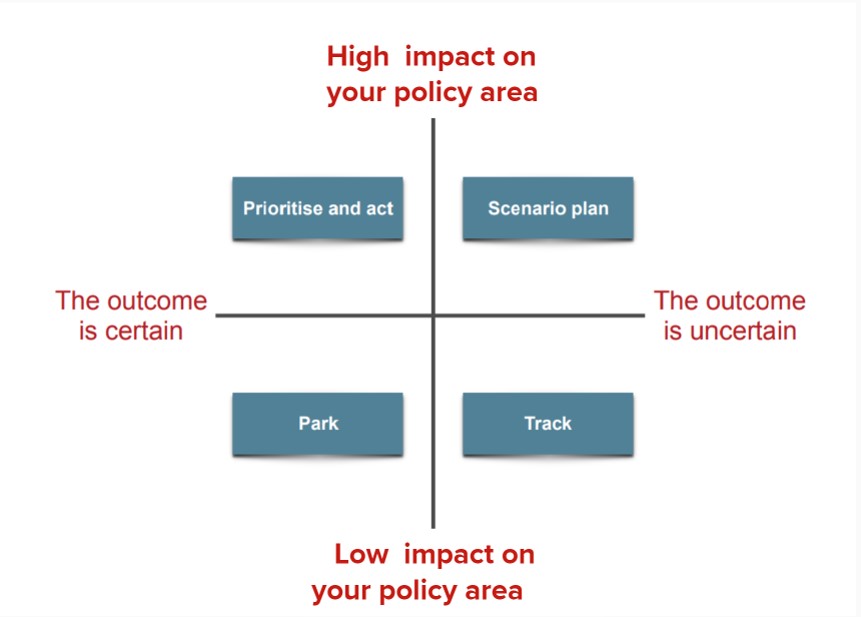In partnership with Public Health Wales, Natural Resources Wales, and the Future Generations Commissioner’s Office, Welsh Government recently held a series of workshops with Public Services Boards (PSBs) across Wales on considering future trends as part of their local well-being assessments. The aim of the workshops was to explore the trends that could be driving change in the long term and how futures thinking techniques can help PSBs evaluate what that may mean for their well-being assessments.
Background
Ahead of the publication of the Future Trends Report Wales 2021 in December, the workshops provided an opportunity to reaffirm the importance of embedding long-term thinking when assessing local well-being.
Under the Well-being of Future Generations Act, PSBs must publish an assessment of the state of economic, social, environmental and cultural well-being in their areas no later than the date of an ordinary local government election. Their local well-being plans must be published within a year of those elections.
The assessment must include predictions of likely future trends that may impact the well-being of the area, and refer to the Future Trends Report to ensure the long-term needs of the area are taken into account.
Exploring the dynamics of change
The aim of the workshops was to provide an opportunity for PSBs to discuss the key trends that will be featured in the Future Trends Report, to what extent these trends may relate to the various regions within Wales, and how they may affect planning for the future.
Workshop attendees were provided with a list of likely trends and were asked to complete an impact-certainty matrix using the digital collaboration platform MURAL. Categorising the trends in this way can help identify what next steps, if any, are required (see Figure 1). This futures exercise required attendees to consider what the impact of each trend would be on their local area and think about how certain they are about the impact, and how important they think it will be in terms of affecting well-being. Officials supported the PSB attendees in exploring the potential impacts of a specific trend where they felt the potential impact was important but uncertain. Some key questions were asked during the workshop:
- What could the potential outcome of this trend be?
- Do you consider this trend an opportunity or a threat?
- What action can you take to harness this opportunity or mitigate this threat?
- Who else do you need to engage with to help you better understand the issue or take action?

Some key principles to consider were also outlined in the workshop, including:
Embracing and managing uncertainty
When dealing with uncertainty, the more you think about how different scenarios could play out, the more questions and uncertainties you are likely to uncover. The future is an uncertain place and the aim of futures thinking is not about how to find the ‘right’ answer but about how to make the best possible decisions by thinking about all the possibilities, and by flushing out potential assumptions and biases.
Involving others
It is important to involve people with an interest in the well-being of the area to better understand the potential impacts of trends. Incorporating diverse perspectives will challenge existing assumptions and will uncover blind spots. Anyone who is likely to use the outputs of the assessment should be involved in their development if possible.
Moving to more conscious futures thinking
‘Futures thinking’, or ‘scenario planning’ is something humans do every day – we make decisions based what we expect to happen as a result. It is important to remember that we are not passive observers; we have a role in determining the shape of the future.
The outcome
The 90-minute workshops helped start to uncover the trends that PSBs need to think about, to monitor, and those which are important for the well-being of an area but have an uncertain outcome. The workshops helped strengthen the understanding of the trends, identify some initial knowledge gaps, and helped attendees consider additional stakeholders to involve going forward. The workshop also gave attendees practical experience of a futures-based exercise. We hope this can act as a blueprint for further such exercises within the PSBs.
The futures exercise used during the workshops was based on the ‘Driver Mapping’ tool included in the UK Government’s Futures Toolkit. This exercise represents just one of many different tools that can help embed long-term strategic thinking within the local well-being assessment process. Many futures tools are flexible, and can be adapted as required. We would encourage readers to explore some of the other futures tools and resources available:
- Three horizons: A toolkit to help you think and plan for the long-term
- A brief guide to futures thinking and foresight
- UK Government: Trends Deck Spring 2021
- Global Centre for Public Service Excellence: Foresight – The Manual
- WcVA – Building Better Futures: Toolkit
- Future Trends Report
- Futures for Wales
- Shaping the Trends of Our Time
- Sustainable Development Goals Report
- The Global Risks Report 2021